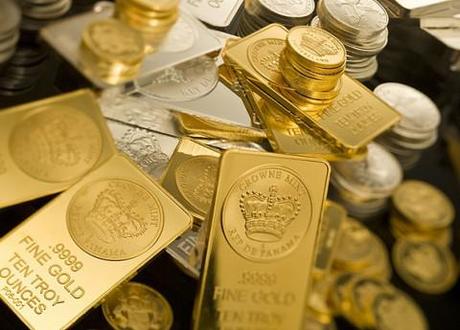
Gold bars: fine if you're a dragon. Photocredit digitalmoneyworld http://www.flickr.com/photos/digitalcurrency/2438119267/sizes/z/in/photostream/
The entire world is experiencing global financial jitters, again. The FTSE 100, Britain’s share index, has had its largest one-day fall since 30th November 2010. The Dow Jones Industrial Average (America’s equivalent) has been experiencing a losing run not seen since since 1978. More than £1.2 trillion has vanished from the value of global equities. Fears are growing that the US economy is teetering on the edge of recession and might lose its AAA credit rating to the red pens of the schoolmasterish rating agencies; the jelly-like quiverings of the Eurozone are also causing stock markets to plunge as bail-outs for Spain and Italy look increasingly likely as the interest rates they must pay on their debts are rising to 6 percent (whereas Germany pays 2.4 percent). The UK is a safe haven; also you need not fear if you’re a dragon, as the price of gold has risen. Think of what you can do with all your lovely hoard! Oh, and meanwhile, the Swiss and the Japanese are entering into a currency war to attract investors.
- The FTSE 100 has fallen “133.88 points to 5584.5,” reported Alistair Osborne on The Daily Telegraph, “wiping £35 billion off the value of the market,” whilst Switzerland has “cut interest rates by half a percentage point to devalue a Swiss franc pursued by investors in preference to the relatively riskier euro and dollar.” Uri Landesman of Platinum partners in New York told Osborne: “It’s not just the US, it’s the whole world. I’m having trouble remembering the last good data point.”
“The market sentiment is on apocalypse level. Opinions are resurfacing that the US could possibly slide into a recession.” said Peter Buergler, a trader at Luzerner Kantonalbank in Switzerland.
- Sam Fleming on The Times reported that European Commission President José Manuel Barroso has been urging the eurozone “to rush through crisis-fighting reforms,” whilst Jyrki Katainen, the Finnish Prime Minister, told the paper that Europe was “in a very dangerous situation.”
- “How far are we from #gfc2?” asked Richard Murphy on The Guardian, referring to the Twitter hashtag for “global financial crisis 2.” You’re “seriously misguided” if you think we’re out of the crisis. The problem is, there are two economies in the world. The “real” one, and the “feral” one. This latter is hardly related to the real, and exists “only as entries in computer ledgers.” What backs up these entries has little real worth: derivatives, shares and over-priced property. The feral economy has extracted wealth from the real, and stashed it where it sits unproductively, leading to debts in the real economy. Also, the feral economy’s undermining of currencies for short-term gain has “brought the whole edifice to the point of breaking”. Whilst little effect is felt in the feral economy, as “downsides can be traded as much as upsides,” it has brought “destitution, unemployment, real failure and fear to real lives.” The solution is to bring the feral economy “under control.” It’s possible: green quantitative easing; forcing new investment policies onto funds exposed to feral policies; if necessary, countries should demand banks to deposit their cash in Treasury deposit receipts. In order to impose these ideas, we need politicians and courageous states more than ever before.
- Sure, it’s puzzling, said Hamish McRae in The Independent. We’re all squeezed, even the government. But growth in the first half of the year wasn’t that dismal. It’s the second that’s worrying. Whilst the UK doesn’t look too bad, it’s the outside world that has a dark message. Emerging economies are growing; developing countries which export to them are reaping the benefits. Canada and Australia too are on track. But its the developed world that’s struggling, “and those struggles seem more troubling now than they did in the spring.” Hopes of calm in the Eurozone have been dashed. As for the US – well, growth isn’t “nearly fast enough.” The world sees the UK as “having made a decent start at getting our public finances under control,” and “ our best companies are doing just fine.” But “one thing is sure: there is no boom visible in the months ahead.”
- So why is everything in Europe so expensive then? asked Alex Brummer in The Daily Mail. The euro hasn’t weakened. The pound has fallen, so “sterling will not buy you that much in the sun drenched resorts of the Mediterranean.” And though the PIIGS – Portugal, Ireland, Italy, Greece and Spain – are in a parlous state, that’s not the same throughout Europe. Germany’s growing, and in fact nine out of the 17 countries which make up euroland have expansion rates in excess of 3 per cent. That is twice that being achieved in Britain and the United States.” Also, the worse performing countries in the eurozone have had a “free ride”, so that wages and prices are much higher than they ought to be, whilst production falters. “The result is that a fish dinner in a seaside Taverna in Crete could cost anything up to 90 euros for two people. It would be cheaper to dine at the Dorchester in London.”

